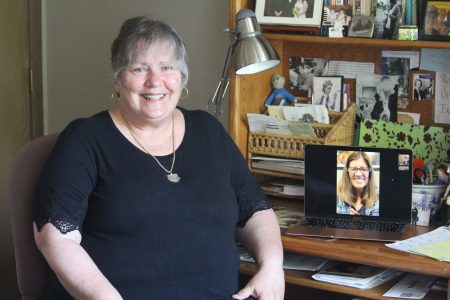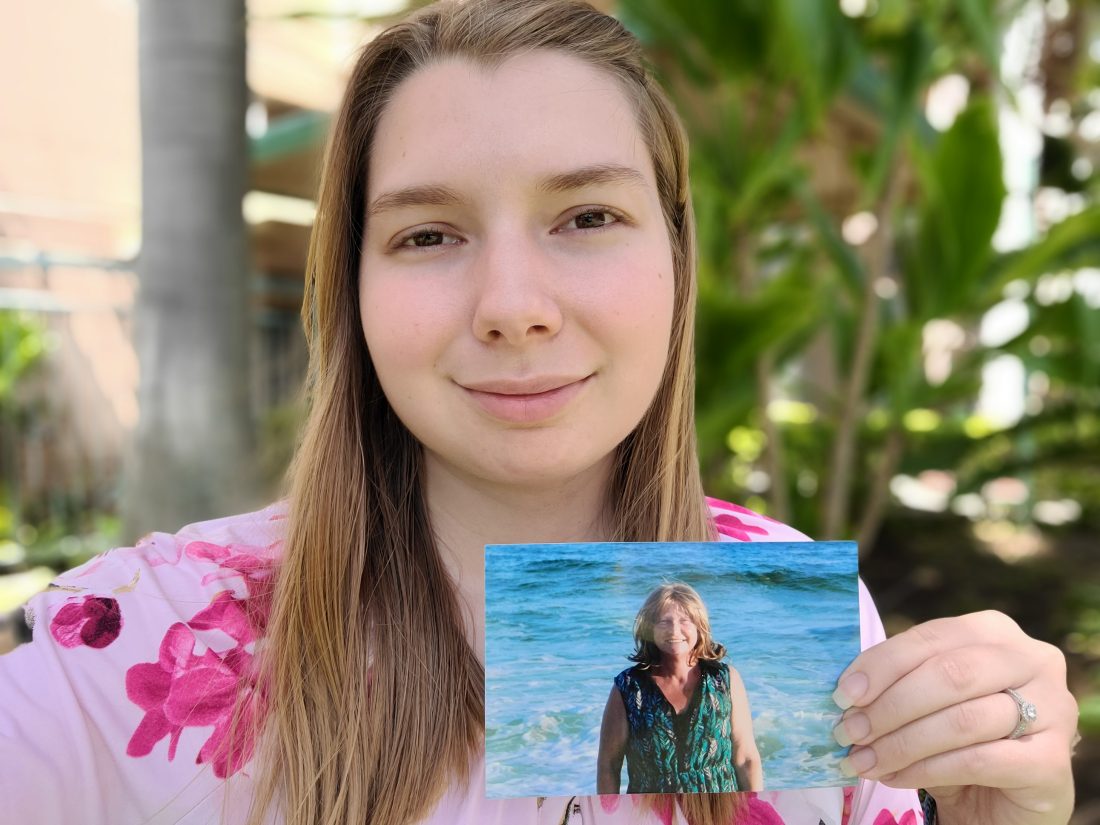Writing during COVID-19 helps wordsmiths grieve, test new skills and find ‘a real sense of purpose’

photo by: Lauren Fox
Kathy Hanks, left, and Amy Bickel, on screen, are pictured on June 12. They have been working on a book for the past two years, and wrote 14 chapters — nearly the entirety of the book — during the COVID-19 pandemic.
Every morning at 6:02 a.m., Kathy Hanks and Amy Bickel would wake up and log on to their computers. In the same Google Document, the women would write in the morning hours from their respective homes in Lawrence and Burrton, Kan.
Hanks and Bickel, former colleagues at The Hutchinson News, have been working on a book for the past two years. They completed the majority of their research and interviewing processes before the COVID-19 pandemic hit. So when the stay-at-home orders came into place, the friends got to writing.
It took the women about three months to complete 14 chapters — nearly the entirety of the book.
“I had a real sense of purpose; I still do,” Hanks said. “It was something to look forward to every single morning.”
There was so much happening during the pandemic that was out of their control, Hanks noted, but devoting themselves to their writing was something they could regulate.
“Instead of getting up and turning on the news, we got up and went back in history,” said Hanks, who most recently worked as a reporter at the Lawrence Journal-World.
Hanks left in December to devote herself to the project before moving to Roanoke, Va., to spend time with her grandkids. In an interview on Friday, Hanks did not share specifics of the book, but said it is a historic narrative set in London during The Blitz, a German bombing campaign against the United Kingdom in 1940 and 1941.
Hanks and Bickel collaborated on the book every morning until around 8:30 a.m., when Bickel had to begin work for her other job. Even on Saturdays, the writers would set their alarms specifically to 6:02 a.m., except on a couple occasions when Hanks and Bickel needed a bit more sleep.
Though COVID-19 postponed so much, it didn’t postpone their writing process, Hanks said.
“We knew for a fact we were going to finish this book and we really believe it’s going to be a bestseller,” she said.
The Journal-World spoke to three other writers across the country who also passed the time during the pandemic and its subsequent stay-at-home orders by working on writing projects.
Book promotion turns virtual
For recently published author Patrick McConnaughey, the spring was supposed to be his season for promoting his self-improvement book with speaking engagements and workshops.
So when large in-person gatherings were barred, McConnaughey turned to virtual platforms. The 69-year-old retired administrator from Hillman, Mich., started making Youtube videos and created a website for the first time.
It was a different language, he noted, but “I’m a person that likes a challenge,” he added.
“It helps the creativity in website design or Youtube videos — I mean, I have a ball making them and editing them,” he said. “The time goes by and the world disappears for a while when you’re creating these things.”
It took McConnaughey three years to complete his book, “The Great Love Story of Your Life: Learning to Love Yourself and Others and Find Purpose,” which came out in November. The book is geared toward people who are at a point where they are ready to improve — people who have already gotten through a catastrophe or crisis, McConnaughey said.
For his next project, McCounnaughey hopes to create a daily guide book to help people navigate through struggles, an idea that was hatched by engaging with others on the Internet during the COVID-19 outbreak and noticing how many people were struggling more with anxiety and depression.
A short story with a short deadline
Jen Sako, a writer in Pittsburgh, said the writing project she participated in during the pandemic helped speed up her writing process.
Sako was one of multiple authors to contribute a short story to a romance collection called “Love in the Time of Corona: Vol. II.” Sako missed the call for the first volume of the COVID-19-themed short romance stories, and when she heard about the second volume, she only had a few days to submit her piece. She wrote about 10,000 words in three days.
“It was the fastest thing I’ve ever done,” Sako said, noting that it was “a good exercise for me.”
Sako’s short story is about a waitress and sommelier whose love story develops over virtual wine tastings. All the stories in the collection had to be set in the COVID-19 pandemic and characters had to adhere to safe practices, Sako said — hence, the virtual dates.
Sako calls the collection “true escapism,” and said writing her story was a fun exercise that helped develop her writing skills.
“We weren’t, of course, expecting to change any lives or anything like that,” she said. “It was just sort of a fun thing for us to do.”
Processing grief through writing
When Megan Fernandes’ mother died in January, she knew she would write about it one day. But COVID-19 prompted Fernandes, a business reporter in Honolulu, Hawaii, to write about her mother and her grief sooner than expected.
The extra time at home during the pandemic stirred up Fernandes’ feelings of grief, as did seeing and wearing masks.
“The day my mother died was the last time I wore a mask before then, and now every time I put one on, I relive that day,” Fernandes, 24, wrote for a website, Hawaii Stories.

photo by: Contributed Photo
Megan Fernandes holds a photo of her mom, Catherine Schuller, who died in January. Fernandes has turned to writing during COVID-19 to help her deal with her grief.
Fernandes’ essay for the website was the first piece she wrote about her experience, but it’s just the beginning, she said. Writing is how she’s always coped with things, and it has helped her face her grief during the pandemic.
“I don’t know, if COVID didn’t happen, when I would have sat down to start getting all that out,” she said.
After her mom’s death, Fernandes’ plan was to try to go back to normal life. She thought if she returned to life as usual she wouldn’t feel as sad.
“I wouldn’t feel like that shadow was still following me,” she explained.
But the more she tried to return to life as normal, the deeper she sank, Fernandes recalled. It wasn’t until the COVID-19 pandemic that she was able to take a step back, examine her grief, and turn to writing as a way to cope with it.
“It made me realize that trying to come back and move on right away, I was kind of holding my grief in and not expressing it,” she said.
Fernandes is planning to write a memoir about her mother’s death. She took notes throughout the process, and is writing the story now. Her mother’s death left her “shattered,” Fernandes said.
Writing, meanwhile, is helping her pick up the pieces.







